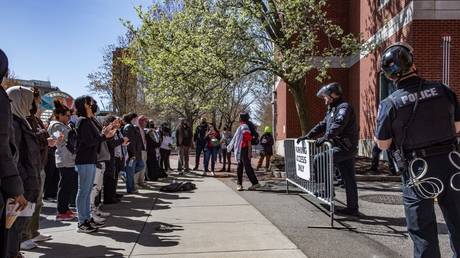‘Star Wars’ protest against forced vaccinations in California
by Erin Elizabeth, Health Nut News:
 Written by Joseph Mercola, D.O., Ph.D.
Written by Joseph Mercola, D.O., Ph.D.
Star Wars: Galaxy’s Edge opened May 31, 2019 at Disneyland Resort in California, and a small group of “freedom fighters” staged a protest against forced vaccinations outside the entrance. Dressed as Star Wars characters and holding signs in protest against mandatory vaccinations, the protestors took the opportunity to demonstrate against this violation of informed consent rights. As the video explains:
“A small group of freedom fighters took this opportunity to spread truth about the sinister mandatory vaccination laws plaguing the nation. These activists stood in front of all entrances to Disneyland holding signs exposing the truth about the vaccine program.
No one entering the park that day could avoid moving past these activists and the truth they came to spread in hopes to restore freedom to the galaxy.”
RELATED STORY:
Why is Disney an opportune place to learn about vaccinations?
The activists likely chose the location because crowds of up to 200,000 people were expected to visit the theme park that day,1 presenting an opportunity to gain lots of exposure.
The fact remains that a number of states are eliminating conscientious, philosophical and religious vaccine exemptions, leaving only medical exemptions signed by a state-approved doctor or other medical worker — but, according to federal vaccine use guidelines, almost no health condition qualifies for a medical exemption.
In June 2019, New Yorker parents lost their right to obtain a vaccine exemption for religious belief for their children to attend school. Earlier in the year, the Washington legislature voted to remove the personal belief exemption for the measles-mumps-rubella vaccine. Effective September 1, 2021, parents in Maine will not be able to send their children to school with a religious or philosophical belief vaccine exemption as well.2
“The legal right to obtain a flexible medical, religious and conscientious or philosophical belief vaccine exemption is being threatened in many states with bills proposing to severely restrict or remove exemptions from vaccine mandates,” the National Vaccine Information Center (NVIC) explains.3
RELATED STORY:
This violates your right to informed consent, which means you have the right to be fully informed about the benefits and risks of a medical intervention and the freedom to make a voluntary decision about whether or not to accept those risks without being coerced or punished for your decision.

The right to make an informed decision about any and all medical procedures, including vaccination, is essential for personal freedom as well as individual health, especially in light of research that shows some people are more susceptible to adverse reactions to vaccines than others. According to a 2012 report from the Institute of Medicine:4
“Both epidemiologic and mechanistic research suggest that most individuals who experience an adverse reaction to vaccines have a preexisting susceptibility.
These predispositions can exist for a number of reasons — genetic variants (in human or microbiome DNA), environmental exposures, behaviors, intervening illness, or developmental stage, to name just a few — all of which can interact …
Some of these adverse reactions are specific to the particular vaccine, while others may not be. Some of these predispositions may be detectable prior to the administration of vaccine; others, at least with current technology and practice, are not. Moreover, the occurrence of the adverse event is often the first sign of the underlying condition that confers susceptibility.”
RELATED STORY:
Some Disney ‘measles’ cases may have been vaccine reactions
In early 2015, Disneyland was the site of a measles outbreak5 that brought the state’s vaccine exemptions into the spotlight. However, a portion of those affected may have been experiencing a reaction to the live virus measles vaccine.
In a Journal of Clinical Microbiology paper, researchers described new technology developed to “rapidly distinguish between measles cases and vaccine reactions to avoid unnecessary outbreak response measures such as case isolation and contact investigations.” According to the paper:6
“During the measles outbreak in California in 2015, a large number of suspected cases occurred in recent vaccinees. Of the 194 measles virus sequences obtained in the United States in 2015, 73 were identified as vaccine sequences.”
In other words, 37.6% of suspected measles cases in the 2015 Disneyland measles scare in California were actually vaccine strain measles infections and not caused by transmission of wild-type measles.
The CDC currently recommends that children get two doses of MMR vaccine; the first dose is recommended between the ages of 12 and 15 months, and the second dose between 4 and 6 years. The second dose was recommended starting in 1989, “in response to instances of primary vaccine failure of one dose.”7
Measles outbreaks in the U.S. highlight increasing instances of vaccine failure and some have called for a third “booster” dose of MMR. But here’s an important distinction: While there is an assumption that getting a second or third “booster” dose of MMR will “boost” immunity to the diseases, this may or may not be the case.
Loading...

